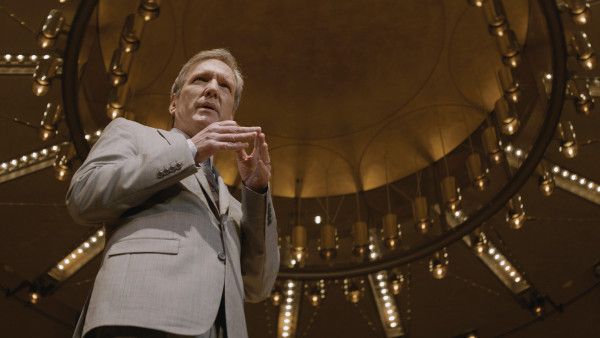Eye For Film >> Movies >> Rememory (2017) Film Review
Rememory
Reviewed by: Amber Wilkinson

The idea behind this film - of a machine that can be used to access and relive memories exactly as they were - has bags of potential. But unlike fellow Sundance film Marjorie Prime, which uses its clever science fiction element to interrogate the emotions of its characters and the very nature of recollection, the machine here proves to be little more than a MacGuffin for a murder mystery set-up and a side helping of sentimental stodge.
Gordon Dunn (Martin Donovan) has developed the Rememory machine, which can show you the unfiltered truth of a moment, without the usual human trappings of time and additional experience. This is of particular interest to Sam Bloom (Peter Dinklage in a role specifically written for him), an architectural model maker who is trying to come to terms with grief. He has an fascination with Dunn and his gadget and, after the inventor meets a sticky end late one night, he decides to turn amateur detective to find out whodunnit at the same time as finding "The Machine" which he hopes will finally allow him to move on from the night he witnessed the death of his brother (shown here in the film's first scene).

As he begins to experiment with his memory of his brother's death, there are hints that it's having a worrying effect, but like so many of writer/director Mark Palansky and co-writer Mike Vukadiniovich's most interesting ideas, it isn't developed fully enough. Meanwhile, the amateur sleuth element of the plot presents its characters in a procession worthy of a TV series. In between chats with Dunn's widow Carolyn (Julia Ormond, like Dinklage, elevating the material as much as she can), Sam seems destined to be told about a new potential witness from Dunn's disparate crew of psychiatric patients just at the time when he's exhausted the information given by the previous one. This sort of 'happy coincidence' can work in stage plays (an area where Vukadinovich has previously displayed considerable talent) but in a movie environment, it feels forced and fake.
The decision to have Sam create miniature figures representing each of his 'suspects' is also odd. Although it provides the opportunity for some nice camera shots - and Gregory Middleton's lensing in general is enjoyable - there's never any real reason for it. Like so many aspects of the film, it feels like a potential good idea that has subsequently gone underdeveloped. When the script is allowed to get going on the themes of loss and regret - particularly between Dinklage and Ormond - there are hints of what might have been but the whole enterprise is weighed down by over-plotting that means it ends up being less profound than profoundly confusing.
Reviewed on: 16 Mar 2017















